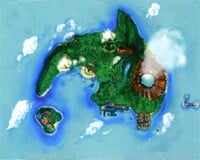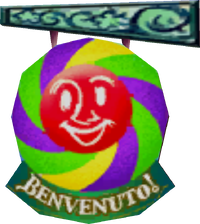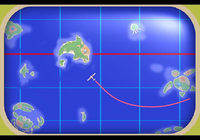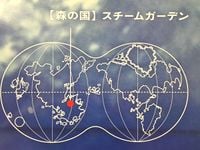Isle Delfino
- This article is about the location in Super Mario Sunshine. For the musical composition of the same name, see Isle Delfino (theme).
| Isle Delfino | |
|---|---|
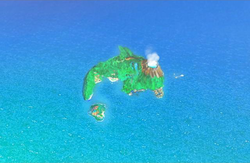
| |
| First appearance | Super Mario Sunshine (2002) |
| Latest appearance | Super Mario 3D All-Stars (2020) |
| Capital | Delfino Plaza |
| Inhabitants | Piantas, Nokis, Strollin' Stus, Yoshis |
- “Welcome to the sun-drenched tropical paradise of Isle Delfino! We're so pleased to welcome you to our beautiful home! Come enjoy a natural wonderland to which we've added the world's finest resort facilities, a spectacular amusement park, and succulent seafood! This and more await you on Isle Delfino! Come relax and let us refresh your body and spirit.”
- —Pianta, Super Mario Sunshine
Isle Delfino is a tropical paradise island and vacation resort inhabited by Piantas, Nokis, Yoshis, Sunflower Kids, and Raccoons. Alongside the smaller Pinna Island, it resembles a dolphin, as indicated by its name, which means "dolphin" in Italian. This is a reference to the Nintendo GameCube's preproduction code name, Project Dolphin. Isle Delfino is the main setting of Super Mario Sunshine, and has since reappeared in many spin-offs, including the Mario Kart series.
Many of the locations on Isle Delfino can be clearly seen from some of the other locations on the island, with the exception of Noki Bay, which remains virtually hidden from the rest of the island, though small glimpses of it can be seen from the tops of some of the large palm trees in Pianta Village.
History[edit]
Super Mario Sunshine[edit]
Mario, Peach, Toadsworth, and some Toads take a trip to Isle Delfino in Super Mario Sunshine. However, the island had been covered in graffiti by the mysterious Shadow Mario, who the people think is Mario. With the help of the water pack FLUDD, Mario is forced to get rid of all the paint on the island and clear his name by defeating the imposter that has been causing trouble. Shadow Mario turns out to be Bowser Jr., who soon kidnaps Peach, but after Mario defeats him and his father, Bowser, life on the island returns to normal and Mario, Peach, and their friends enjoy the rest of their stay on Isle Delfino.
Mario Kart series[edit]
Isle Delfino has appeared in five of the Mario Kart games with new courses and stages based on it.
In Mario Kart: Double Dash!!, Peach Beach takes place on Isle Delfino. After the player completed the Grand Prix, the award ceremony was held there. Mario Kart DS features Delfino Square, which takes place in autumn instead of the usual tropical weather. In Mario Kart Wii, both Peach Beach and Delfino Square returned in the Retro cups, along with a new battle stage called Delfino Pier, which likely takes place in the docking area of Delfino Plaza. Additionally, Coconut Mall takes place on Isle Delfino, and returns in Mario Kart 7 and Mario Kart Tour as a classic course, as well as in Mario Kart 8 Deluxe as part of the Booster Course Pass. Mario Kart 8 and Mario Kart 8 Deluxe also features Sunshine Airport, an airport located on Isle Delfino.
Other games[edit]
Locations on Isle Delfino are shown in a couple of Mario Party minigames. Mario Power Tennis includes both the Delfino Plaza Court and the Gooper Blooper Court, which is set in Ricco Harbor.
Delfino Plaza is also one of the boards in Itadaki Street DS and Fortune Street. It is also one of the stages in Super Smash Bros. Brawl, Super Smash Bros. for Wii U and Super Smash Bros. Ultimate.
Language[edit]
It has been requested that more images be uploaded for this section. Remove this notice only after the additional images have been added. Specifics: The Sand Cabana sign in Japanese
Isle Delfino is heavily associated with the Italian language. In Super Mario Sunshine, all locations on the island are named partially in Italian (entirely in Italian in the German version of the game), and signs reading "BENVENUTO!" can be seen in Delfino Plaza.
In addition to English and Italian text, several signs on Isle Delfino are written in a unique spiraling script that is a cipher for the Latin alphabet.[1]
| Instance | Translation | Description |
|---|---|---|
 Signs |
RZTU BOD TVR | No apparent meaning. In the Japanese version, signs instead have English text reading "This isn't gonna Just a little stick. Ready? 1...2...3. There you all do." |
 Sand Cabana |
BAR GELATO | Reads "BAR MAMMA" in the Japanese version, matching up with the Japanese name of Gelato Beach, "Mamma Beach". |
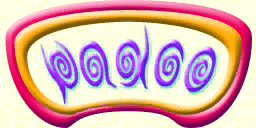 Entrance to Pinna Park |
PARCO | Italian for "park". |
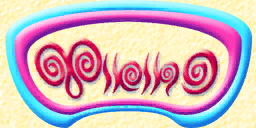 Pinna Park's pirate ship ride |
VIKING | Matches the Guide Book's caption for the ride in Pinna Park's image. |
Noki Bay's Guide Book image |
NOKI | Located in the corners of the image. Changed from the Japanese version, which instead has MARE to match the name of the area and eponymous species. |
Wall paintings |
[various] | Some wall paintings have a single letter on them. |
 Various places in Noki Bay |
ABCDEFGHIJKLMNOPQRSTUVWXYZ | A repeating texture. |
 Flag on top of the orange onion dome in Noki Bay |
MARE VILLAGE | "Mare" is the Japanese name for Noki. |
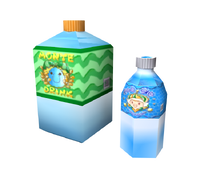 Small water bottles |
MARE | "Mare" is the Japanese name for Noki. |
Locations[edit]
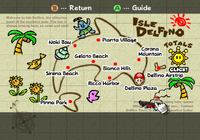
- Delfino Airstrip – The island's airport.
- Delfino Plaza – A large plaza, and the main location of Super Mario Sunshine.
- Bianco Hills – A lakeside village with a giant windmill.
- Ricco Harbor – A busy fishing port located on the outskirts of the island.
- Gelato Beach – A sandy and sunny beach and its surrounding coral reef.
- Pinna Park – The amusement park on the island where many Stus live.
- Sirena Beach – An extravagant beach with a hotel on it.
- Noki Bay – A peaceful and serene bay where mainly Nokis live.
- Pianta Village – A high village populated mostly by Piantas.
- Corona Mountain – An active volcano high above Delfino Plaza.
Other locations[edit]
- Peach Beach – A luxurious beach often visited by Peach.
- Delfino Square – A small port housing an even smaller market.
- Coconut Mall – A huge, three-story mall filled with Piantas and Miis.
- Delfino Pier – A sunken section of Isle Delfino, which is often submerged by water.
- Sunshine Airport – An airport located among some islets.
Characters[edit]
Species[edit]
Enemies[edit]
Gallery[edit]
Map from Super Mario Sunshine
Photo of a clay model of Isle Delfino made by Yoshiaki Koizumi for Super Mario Sunshine
Names in other languages[edit]
| Language | Name | Meaning | Notes |
|---|---|---|---|
| Japanese | ドルピック島[?] Dorupikku Tō |
Dolphic Island | |
| Chinese (simplified) | 德尔皮克岛[2] Dé'ěrpíkè Dǎo |
Dolphic Island | |
| Chinese (traditional) | 德爾皮克島[3] Dé'ěrpíkè Dǎo |
Dolphic Island | |
| French | Île Delfino[?] | Isle Delfino | |
| German | Isla Delfino[?] | Isla Delfino; Spanish for "island" and Italian for "dolphin" | |
| Italian | Isola Delfina[4] | Dolphic Island | |
| Korean | 돌픽 섬[?] Dolpik Seom |
Dolphic Island | |
| Russian | Остров Дельфино[5] Ostrov Del'fino |
Isle Delfino | |
| Spanish | Isla Delfino[?] | Dolphin Island (Spanish for "island" and Italian for "dolphin") | |
| Swedish | (Ön) Delfino[?] | Delfino (Island) |
Trivia[edit]
- Starshine Beach Galaxy from Super Mario Galaxy 2 resembles Isle Delfino.
- In the introductory cutscene of Super Mario Sunshine, the player can see other islands surrounding Isle Delfino, which are shaped like an ocean sunfish (northwest), a sting ray (west), a crab (southwest), a small fish (south), a sea turtle (east), and a jellyfish (northeast). In this cutscene it is also implied that Isle Delfino is directly on the equator of the planet, as indicated by the red line.
- Although Isle Delfino appeared on a promotional world map prior to Super Mario Odyssey's release, it does not appear in the final game.
References[edit]
- ^ 2CPhoenix (February 1, 2024). Mario Sunshine’s Mysterious Text. YouTube. Retrieved February 12, 2024.
- ^ 《超级马力欧64》、《超级马力欧阳光》和《超级马力欧银河》。 3款历代的3D马力欧收录在Nintendo Switch的《超级马力欧 3D 收藏辑》,将于9月18日发售!. Nintendo HK (Simplified Chinese). Retrieved September 3, 2020.
- ^ 《超級瑪利歐64》、《超級瑪利歐陽光》和《超級瑪利歐銀河》。3款歷代的3D瑪利歐收錄在Nintendo Switch的《超級瑪利歐 3D 收藏輯》,將於9月18日發售!. Nintendo HK. Retrieved September 3, 2020..
- ^ "Isola Delfina" – Guida turistica. Super Mario Sunshine (Italian).
- ^ Official Russian Nintendo website. Archived March 31, 2021, 14:29:16 UTC from the original via Wayback Machine. Retrieved April 15, 2021.
